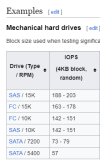For the last couple of months I've been using proxmox to test a bit running linux containers and I'm very happy with the software, it's amazing.
After reading online the difference between zfs (what I default used) and LVM-Thin I've started to test LVM-Thin on my system, but the results I don't understand, I'm sure I'm thinking / doing something wrong and need help.
Useing a i5-7500 Desktop, 24 GB memory 256 GB STA SSD (Proxmox) and a 500GB Hitachi SATA Harddisk. Installing 8.1.3 on the sata SSD and useing the HDD for the CT's.
When I use the HDD as a LVM-Thin storage, create a ubuntu 22.04 CT and run a test ==> dd if=/dev/zero of=file.out bs=1024 count=1000000 oflag=direct the write speed results are between 5.5 and 5.6 MB/s. When I read the data back ( dd if=file.out of=/dev/null bs=1024 ) the results are between 56 MB/s and 84 MB/s. This seems very slow.
After removing the LVM-Thin and creating a ZFS (single disk, no compression and default ashift 12 and changeing /etc/modprobe.d/zfs.conf to options zfs zfs_arc_min=128 options zfs zfs_arc_max=1024) I've tryed again. Same test, different numbers, writeing 205 MB/s and reading 346 MB/s. I could expect a bit of difference, but this seems very strange
Where do I go wrong ?
After reading online the difference between zfs (what I default used) and LVM-Thin I've started to test LVM-Thin on my system, but the results I don't understand, I'm sure I'm thinking / doing something wrong and need help.
Useing a i5-7500 Desktop, 24 GB memory 256 GB STA SSD (Proxmox) and a 500GB Hitachi SATA Harddisk. Installing 8.1.3 on the sata SSD and useing the HDD for the CT's.
When I use the HDD as a LVM-Thin storage, create a ubuntu 22.04 CT and run a test ==> dd if=/dev/zero of=file.out bs=1024 count=1000000 oflag=direct the write speed results are between 5.5 and 5.6 MB/s. When I read the data back ( dd if=file.out of=/dev/null bs=1024 ) the results are between 56 MB/s and 84 MB/s. This seems very slow.
After removing the LVM-Thin and creating a ZFS (single disk, no compression and default ashift 12 and changeing /etc/modprobe.d/zfs.conf to options zfs zfs_arc_min=128 options zfs zfs_arc_max=1024) I've tryed again. Same test, different numbers, writeing 205 MB/s and reading 346 MB/s. I could expect a bit of difference, but this seems very strange
Where do I go wrong ?


